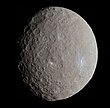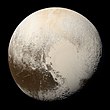(303775) 2005 QU182: Difference between revisions
Appearance
Content deleted Content added
Tom.Reding (talk | contribs) |
Rescuing 1 sources and tagging 0 as dead. #IABot (v1.2) |
||
| Line 72: | Line 72: | ||
'''{{mp|(303775) 2005 QU|182}}''', also written as '''(303775) 2005 QU182''', is a [[trans-Neptunian object]] with a bright [[absolute magnitude]] of 3.8.<ref name="jpldata"/> [[Michael E. Brown|Mike Brown]] lists it as probably a [[dwarf planet]].<ref name="Brown-dplist">{{cite web |
'''{{mp|(303775) 2005 QU|182}}''', also written as '''(303775) 2005 QU182''', is a [[trans-Neptunian object]] with a bright [[absolute magnitude]] of 3.8.<ref name="jpldata"/> [[Michael E. Brown|Mike Brown]] lists it as probably a [[dwarf planet]].<ref name="Brown-dplist">{{cite web |
||
|title=How many dwarf planets are there in the outer solar system? (updates daily) |
|||
|publisher=California Institute of Technology |
|||
|author=Michael E. Brown |
|||
|author-link=Michael E. Brown |
|||
|url=http://www.gps.caltech.edu/~mbrown/dps.html |
|||
|accessdate=2014-03-28 |
|||
|deadurl=yes |
|||
|archiveurl=https://web.archive.org/web/20111018154917/http://www.gps.caltech.edu/~mbrown/dps.html |
|||
|archivedate=2011-10-18 |
|||
|df= |
|||
}}</ref> |
|||
==Distance== |
==Distance== |
||
Revision as of 23:13, 3 September 2016
| Discovery[1] | |
|---|---|
| Discovered by | M. E. Brown D. L. Rabinowitz C. A. Trujillo |
| Discovery date | 30 August 2005 |
| Designations | |
| 2005 QU182 | |
| TNO (SDO)[2][3] | |
| Orbital characteristics[4] | |
| Epoch 13 January 2016 (JD 2457400.5) | |
| Uncertainty parameter 2 | |
| Observation arc | 13642 days (37.35 yr) |
| Aphelion | 184.19 AU (27.554 Tm) (Q) |
| Perihelion | 36.827 AU (5.5092 Tm) (q) |
| 110.51 AU (16.532 Tm) (a) | |
| Eccentricity | 0.66675 (e) |
| 1161.74 yr (424325.7 d) | |
| 13.854° (M) | |
| 0° 0m 3.054s / day (n) | |
| Inclination | 14.032° (i) |
| 78.395° (Ω) | |
| 223.69° (ω) | |
| Earth MOID | 35.8244 AU (5.35925 Tm) |
| Jupiter MOID | 31.769 AU (4.7526 Tm) |
| TJupiter | 6.711 |
| Physical characteristics | |
| Dimensions | 416±73 km[5] |
| 9.61 h (0.400 d) | |
| 9.61 hr[4] | |
| 0.328+0.160 −0.109[5] | |
| 20.9[6] | |
| 3.80±0.32,[5] 3.5[4] | |
(303775) 2005 QU182, also written as (303775) 2005 QU182, is a trans-Neptunian object with a bright absolute magnitude of 3.8.[4] Mike Brown lists it as probably a dwarf planet.[7]
Distance
It came to perihelion in 1971[4] and is currently 50.5 AU from the Sun.[6] In April 2013, it moved beyond 50 AU from the Sun.
It has been observed 81 times over 10 oppositions with precovery images back to 1974.[4]

See also
References
- ^ "MPEC 2007-R03 : 2004 PF115, 2004 PG115, 2004 XA192, 2005 QU182". IAU Minor Planet Center. 2007-09-01. Retrieved 2009-08-26.
- ^ "List Of Centaurs and Scattered-Disk Objects". Minor Planet Center. Retrieved 2009-01-22.
- ^ Marc W. Buie (2008-10-24). "Orbit Fit and Astrometric record for 05QU182". SwRI (Space Science Department). Retrieved 2008-12-09.
- ^ a b c d e f "JPL Small-Body Database Browser: (2005 QU182)" (last observation: 2009-09-18). Retrieved 7 April 2016.
- ^ a b c Santos-Sanz, P.; Lellouch, E.; Fornasier, S.; Kiss, C.; Pal, A.; Müller, T. G.; Vilenius, E.; Stansberry, J.; Mommert, M.; Delsanti, A.; Mueller, M.; Peixinho, N.; Henry, F.; Ortiz, J. L.; Thirouin, A.; Protopapa, S.; Duffard, R.; Szalai, N.; Lim, T.; Ejeta, C.; Hartogh, P.; Harris, A. W.; Rengel, M. (2012). ""TNOs are Cool": A survey of the trans-Neptunian region IV. Size/albedo characterization of 15 scattered disk and detached objects observed with Herschel-PACS". Astronomy & Astrophysics. 541: A92. arXiv:1202.1481. Bibcode:2012A&A...541A..92S. doi:10.1051/0004-6361/201118541.
- ^ a b "AstDys 2005QU182 Ephemerides". Department of Mathematics, University of Pisa, Italy. Archived from the original on 2009-05-16. Retrieved 2009-03-16.
{{cite web}}: Unknown parameter|deadurl=ignored (|url-status=suggested) (help) - ^ Michael E. Brown. "How many dwarf planets are there in the outer solar system? (updates daily)". California Institute of Technology. Archived from the original on 2011-10-18. Retrieved 2014-03-28.
{{cite web}}: Unknown parameter|deadurl=ignored (|url-status=suggested) (help) - ^ "JPL Small-Body Database Search Engine: H < 6 (mag) and a > 80 (AU)". JPL Solar System Dynamics. Retrieved 2014-06-14.
External links
- Orbital simulation from JPL (Java) / Horizons Ephemeris
- (303775) 2005 QU182 at the JPL Small-Body Database


